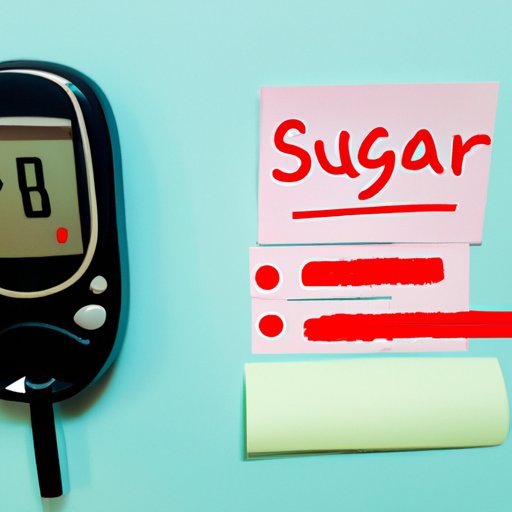
Introduction
High blood sugar levels can have negative effects on your overall health, including increasing the risk of type 2 diabetes, heart disease, and kidney problems. Fortunately, there are several actionable tips you can follow to help lower your blood sugar and improve your overall health. In this article, we’ll explore some of the most effective strategies for bringing down blood sugar levels.
Diet Modifications
A healthy, well-balanced diet can play a critical role in regulating blood sugar levels. Eating a variety of nutrient-dense foods throughout the day can help keep your blood sugar stable. Focus on foods like whole grains, legumes, fruits, vegetables, lean protein, and healthy fats. Avoid processed and sugary foods as much as possible. Additionally, increasing your fiber and protein intake can help slow the absorption of sugar into your bloodstream, further regulating your blood sugar levels.
Exercise
Physical activity can also help control blood sugar levels. Exercise helps your body use insulin more effectively, which can lower blood sugar levels. You don’t need to engage in high-intensity workouts to see the benefits; even moderate exercise can be helpful. Aim for at least 30 minutes of moderate exercise most days of the week. Consider activities like walking, cycling, swimming, or dancing.
Medications
In some cases, medications may be necessary to lower blood sugar levels. If you have type 2 diabetes, your healthcare provider may prescribe medications to help manage your blood sugar levels. Always speak with your healthcare provider before starting any new medications. One common medication used to lower blood sugar levels is metformin.
Stress Reduction
Stress can elevate blood sugar levels, so it’s important to incorporate stress-reduction techniques into your daily routine. Yoga, meditation, deep breathing, and counseling are all effective ways to reduce stress. Find what works for you and make it a part of your daily routine. You’ll likely enjoy other health benefits too, like improved mood and reduced anxiety.
Hydration
Staying hydrated is essential for keeping blood sugar levels in check. Drink plenty of water throughout the day to help flush excess sugar out of your body. As a general rule of thumb, aim to drink half your body weight in ounces of water per day. So if you weigh 150 pounds, you should aim to drink at least 75 ounces of water per day.
Sleep
Lack of sleep can contribute to higher blood sugar levels. Aim for 7-8 hours of sleep per night to help regulate your blood sugar levels. If you have trouble sleeping, try incorporating a bedtime routine to help you wind down before bed. Limit caffeine and electronics before bed, and make sure your room is quiet, dark, and cool.
Conclusion
Lowering blood sugar levels is an achievable goal with the right strategies in place. By eating a healthy, well-balanced diet, staying active, reducing stress, staying hydrated, and prioritizing sleep, you can significantly reduce your blood sugar levels and improve your overall health. Always make sure to consult with your healthcare provider before making any significant lifestyle changes.




